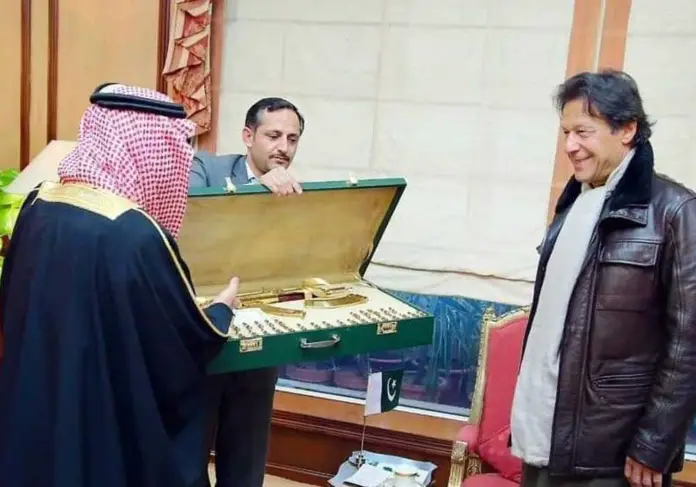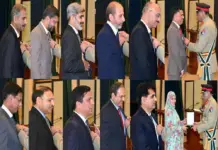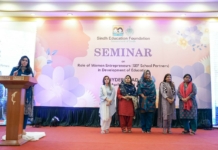On January 3, 2017, before coming to power, Prime Minister Imran Khan was aggressively speaking on TV channels that former Israeli prime minister Benjamin Netanyahu was questioned by the police, and not by the opposition, and his crime was that he received ‘some gifts’.
He was saying that it was quite different in Pakistan where everything was run on gifts, and it was heard in the Supreme Court that Maryam Nawaz received a car worth Rs20 million as a gift.
Three years later in October 2020 after gaining power, the PM was speaking live on the same subject, with the same vigor that he had before.
“Down there, a road was in a dilapidated condition, and I received a gift, I paid the money to Toshakhana for that gift and the rest of the amount I used on that road,” said PM Khan, admitting he bought a gift from Toshakhana – the treasure of the state.
Both clips of his fiery speeches are making rounds on social media these days. Today, PM Khan’s government has completely denied information on the gifts he or other state dignitaries received, despite clear orders from the Pakistan Information Commission (PIC) on separate appeals moved by two citizens.
Though credit goes to the ruling Pakistan Tehreek-i-Insaf (PTI) for raising the value of the payment from 15 to 50 percent to retain the gifts, it has challenged PIC’s orders before the Islamabad High Court (IHC), pleading that these orders were illegal. The government said the information under question was classified and could not be shared as doing so could damage international relations.
Two former prime ministers Nawaz Sharif and Yousaf Raza Gillani and former president Asif Ali Zardari have been facing the National Accountability Bureau (NAB) references for the last couple of years. They are accused that they through dishonest and illegal means for their personal benefit and interest retained the vehicles from Toshakhana ‘against a nominal payment of 15 percent of their total value and caused damage to the public exchequer’.
Amid the fight for access and denial, the fact is that Pakistan does not have a specific law for its Tohshakhana. The Cabinet division mostly makes orders and issues memorandums to look after its affairs. Toshakhana works secretively and the public remains totally unaware of the precious gifts the state dignitaries receive on their behalf from foreign countries, as well as their retention and auction process.
Though Toshakhana, like many other things from the system of governance to infrastructure, is the legacy of the British Raj in the subcontinent, India and Bangladesh have developed proper mechanisms in the form of rules and regulations for their larger national interests.
The information about the gifts received by state heads and dignitaries in both Bangladesh and India is not kept secret and the gifts are displayed on their respective websites for the public.
Bangladesh and India have proper mechanisms, under which state heads and dignitaries need to pay the actual or assessed market value price if they wish to retain gifts that may be antiques or hold historical importance, but Pakistan has not developed a similar system so far to deal with foreign gifts.
Bangladesh introduced a law titled ‘Toshakhana (Maintenance and Administration) Rules 1974’ and later revised these rules in June 2012. Section 4 of the 1974 document says, “A Toshakhana will be established at a suitable place, preferably at the Prime Minister’s secretariat where gifts will be properly displayed so that the public can have an opportunity to see them. Till such times, proper arrangements for accommodating Toshakhana in a suitable place can be made, gifts received by the President may be kept in Bangabhaban. But accounts of the same will be maintained.” Sub-Section 3 of Section 4 says, “The person receiving them shall deposit them in the government Toshakhana.”
Sub-section 4 of Section 4 says, “Gifts of the value, according to an estimation of Toshakhana Evaluation Committee up to the limit mentioned below may be retained by persons receiving them from foreign dignitary/dignitaries without payment of price: Up to the value of Tk. 50,000 only by the President and the Prime Minister; up to the value of Tk. 30,000, only by the Speakers, Ministers, Ministers of state, Deputy Speakers and Deputy Ministers etc; up to the value of Tk. 5,000, only by the Members of the parliament and the government servant, employees of the autonomous and semi-autonomous and other persons.”
The rules, however, have made it clear that the gifts of historical importance, curio, and antiques would not be retained by any person and would be deposited in the Toshakhana whatever might be their market value.
Section 5 of the rules says that all gifts received from abroad or from any visiting dignitary and if their value exceeds the limit mentioned above, then the person who wants to retain them has to pay the actual price.
Bangladesh’s law has categorically mentioned that actual market value must be paid for retention of any gift or as determined by the Toshakhana Evaluation Committee.
Likewise, India introduced a law in 1978 titled, ‘The Foreign Contribution (Acceptance or Retention of Gifts or Presentations) Regulations, 1978’.
According to the rules: “Where such person receives any foreign contribution by way of gift or presentation, he shall, within thirty days of the receipt thereof, intimate to the leader of the Indian delegation, the Secretary to the Government of India in the Ministry of Home Affairs, Ministry of External Affairs and the Ministry or the Department of the Government of India sponsoring the delegation of which he is a member, in writing.”
Interestingly, sub-section 6 says that if any question arises relating to the assessment so made under sub-regulation 5, it shall be referred to the central government who will decide the same.
Section 8 of Indian regulations says, “Every such gift or presentation, the market value in the country of origin of which, as assessed under sub-regulation (5), exceeds three thousand rupees, shall be retained in the Toshakhana provided that such person shall have the option, that exercised by him within thirty days from the date of receipt by him of the intimation under sub-regulation (5), to purchase such gift or presentation on payment of the difference between the market value in the country of origin of such gift or presentation, as assessed under sub-regulation (5) and three thousand rupees, subject to that the option once exercised under this sub-regulation shall be final.”
In both India and Bangladesh, the gifts received by the president, prime minister, or other officials of the government cannot be kept hidden from the public and would be displayed at some appropriate place.
In Pakistan, the civil bureaucracy also receives gifts from the heads of states and top officials of the governments in foreign countries. They also retain these gifts, but the public on the behalf of which these gifts are received, is kept totally unaware about purchasing these precious gifts from the national treasures.
Surprisingly, the Pakistan Cabinet division under the PTI government on December 18, 2018, had issued a notification, saying that all the gifts would be displayed at the prominent buildings and will not be concealed from the public.
It says: “The monetary limits up to which the gifts can be retained by the recipients include gifts up to a value of Rs. 30,000/-(Rupees thirty thousand only) may be retained free of cost by the recipient, gifts valued above Rs.30,000/- may be allowed to be retained by the recipient on payment of 50% of the value exceeding the basic exemption of Rs.30, 000/-. This exemption shall however not be available in the case of antiques and gifts of intrinsic historical value. All such gifts shall be properly cataloged and displayed at the prominent buildings owned by the Government. Different gift articles given by a single dignitary to a functionary at one occasion will be treated as a single gift for the purpose of valuation.”
But not even a single gift was displayed at the prominent buildings under the control of the government since then and people are just kept in the dark about what the people are enjoying in the names of ‘gifts’.







